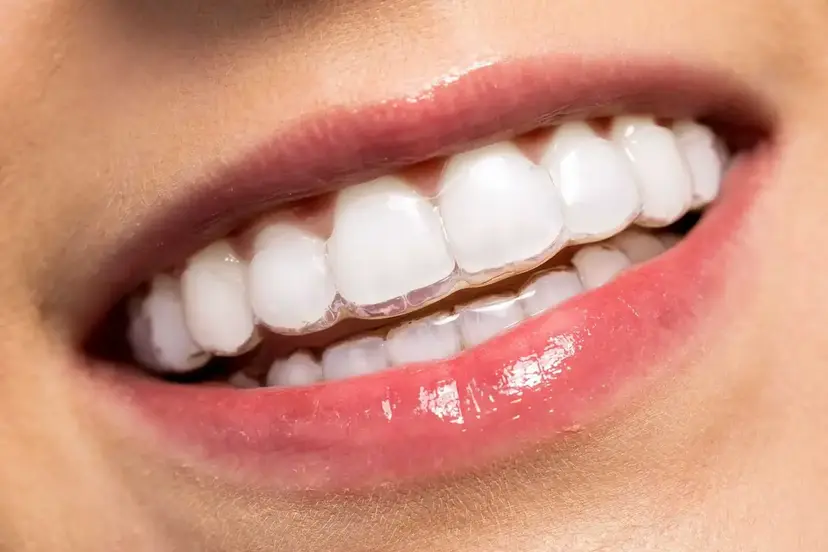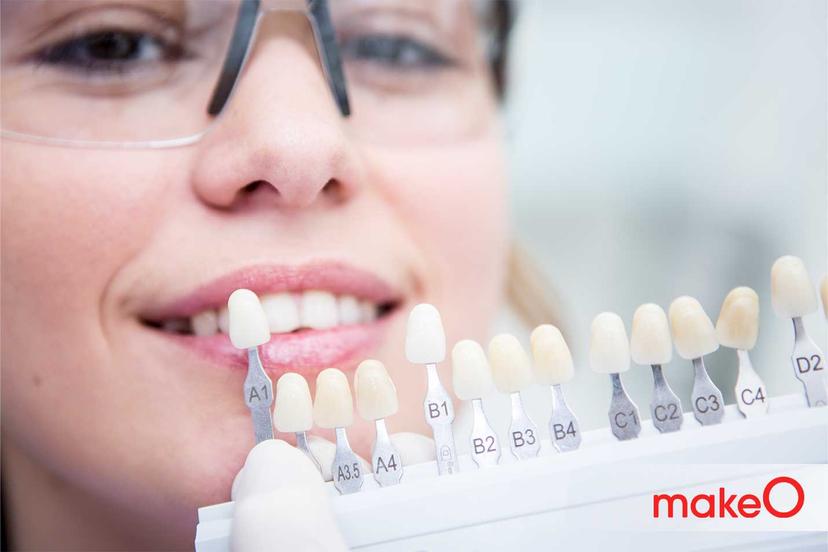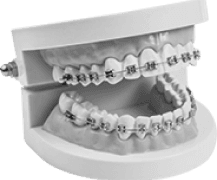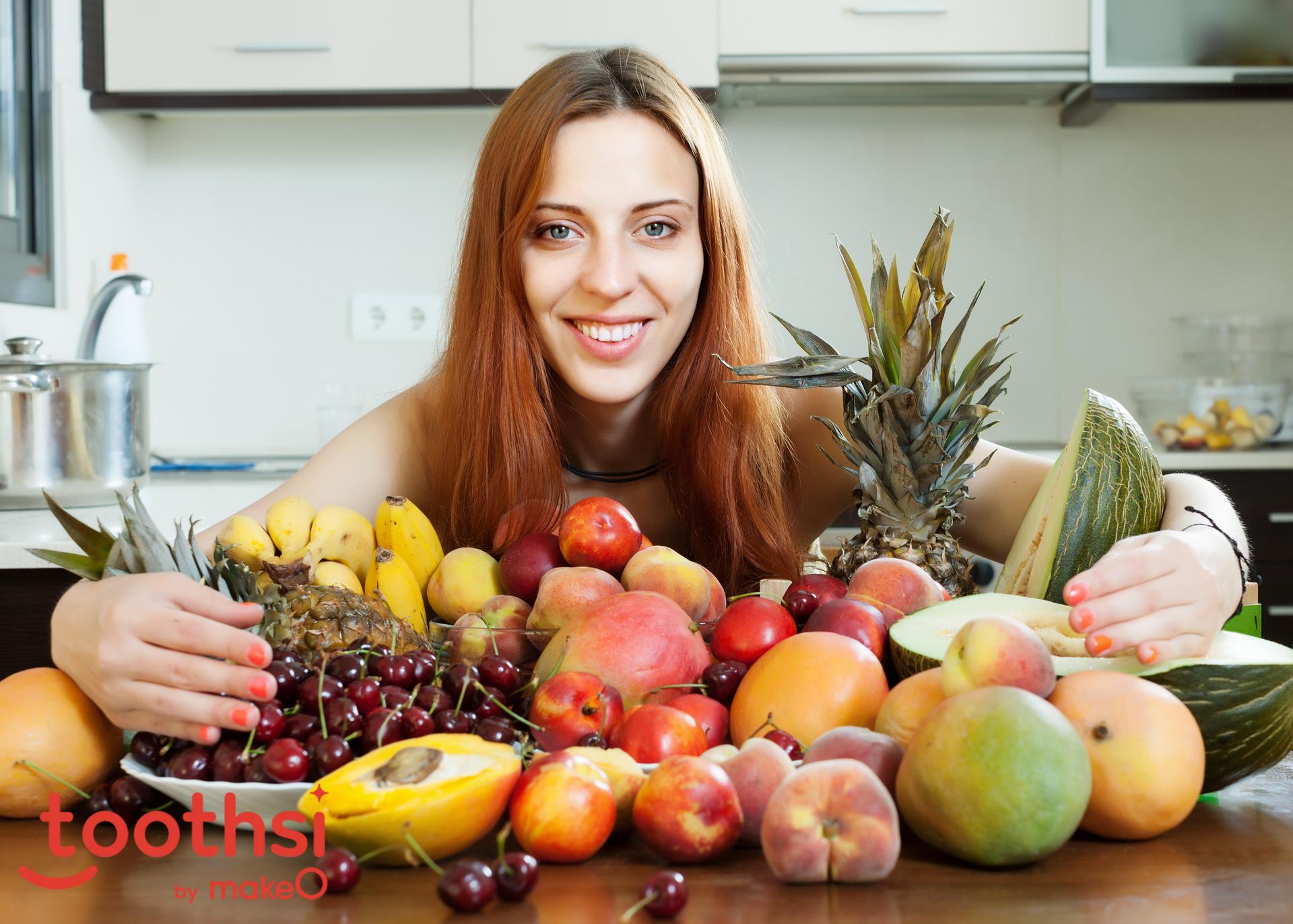MakeO blog
Introduction It’s indeed true that having white teeth not only makes you look young and attractive but also boosts your confidence. But did you know that your diet plays a significant role in brightening your smile? The foods and drinks you consume can promote a whiter smile or contribute to discoloration over time. While brushing and regular dental care are essential, understanding the link between diet and tooth colour could help you make smarter choices for a naturally whiter, healthier smile.
In this blog, we’ll explore the impact of diet on teeth and highlight foods that can either brighten or stain your teeth.
The Connection of Diet with Teeth Discoloration
While genetics and aging can influence the natural colour of teeth over time, your diet plays a crucial role in the development and prevention of tooth stains. Diet not only influences tooth colour but also affects the health of tooth enamel, the thin protective layer that helps maintain a bright, white appearance.
When enamel weakens or wears down, the naturally yellow dentin beneath it becomes more visible, leading to a dull or yellowish look. By selecting foods and drinks that promote oral health and being mindful of their effect on tooth enamel, it is possible to minimize staining and preserve a brighter smile.
Foods to Avoid for a Brighter Smile
To maintain a brighter smile and protect your teeth, there are several foods and beverages to avoid due to their potential to stain or damage your teeth. Foods to be avoided include:
Sugary foods: Sugary foods like hard candy, gummies, and caramel can stick to your teeth and encourage plaque buildup, leading to yellowing and decay.
Certain beverages (such as coffee, tea, red wine): These beverages mainly contain tannins, which is known to stain and discolour your teeth over time.4
Soda and Sports Drinks: Both regular and diet sodas can cause staining due to their acidity and dark colour.
Citrus Fruits: While fruits like oranges, lemons, and grapefruits are healthy, their high acid content can erode enamel over time, leading to yellowish teeth. If you do consume citrus fruits, it is advisable to eat them in moderation and rinse your mouth afterward.
Hence, along with good oral hygiene, avoiding these foods and beverages can help keep you maintain a healthy and white smile!
Foods that Promote Strong, White Teeth
Certain foods can promote strong, healthy, and white teeth by supporting oral hygiene, providing essential nutrients, and helping to protect enamel from damage. Here are some foods that contribute to better dental health:
- Dairy Products (Cheese, Milk, Yogurt): These products are packed with calcium and phosphorus, which help to neutralize all harmful acids and strengthen your teeth.
- Apples: Good source of fibre and water, the crunchy texture of apples stimulates saliva production, helping clean teeth and gums.
- Carrots: Carrots are rich in vitamin A and have a crunchy texture that helps clean teeth by scrubbing away plaque.
- Leafy Greens (such as Lettuce, Spinach, Kale): Leafy greens are packed with calcium, folic acid, and vitamin C which help neutralize harmful acids that lead to stains.
- Strawberries: Strawberries contain vitamin C, which is essential for healthy gums, and they help teeth whitening by removing surface stains.
- Nuts (Almonds, Walnuts, etc.): Nuts are rich in healthy fats, protein, and minerals like calcium and magnesium, which are vital for strong teeth, and they also help scrub plaque off teeth.
- Celery: The high-water content of celery along with its crunchy texture, helps in saliva stimulation which can lead to healthy teeth.
- Green Tea: The components of green tea such as catechins, antioxidants and fluoride make it beneficial to help remineralize tooth enamel and reduce plaque buildup.
- Sweet Potatoes: A rich source of vitamin A, consuming sweet potatoes helps to protect tooth enamel from wear, and stimulates saliva production, which helps keep the mouth clean.
- Lean Proteins (Chicken, Turkey, Fish): Lean proteins are rich in phosphorus, which is important for tooth and bone health, and amino acids that support tissue repair and healthy gums.
- Water: Drinking plenty of water not only helps keep you hydrated, but also stimulates saliva production, which can wash away any food particles and bacteria.
These foods and habits work together to support overall oral health by strengthening enamel, fighting bacteria, and promoting a clean, hydrated mouth.
However, if you are struggling with resistant teeth stains which are affecting your appearance and self-esteem, don’t worry. There are several at-home teeth whitening products like teeth whitening kit, tooth brightening gel , teeth whitening pen, or professional teeth whitening treatments like bleaching to achieve a whiter smile! Your dentist can help you decide the right product or treatment for you.
Conclusion
While genetics and oral hygiene habits are the primary factors influencing tooth colour, certain foods and beverages can either help maintain or discolour teeth. Foods high in calcium, such as dairy products, can strengthen teeth and promote a whiter appearance, while crunchy fruits and vegetables can naturally help remove surface stains. On the other hand, acidic foods and beverages, such as coffee, red wine, and sugary snacks, can erode enamel and lead to staining over time. Maintaining a balanced diet, drinking plenty of water, and practicing good oral hygiene are essential for preserving both the health and whiteness of teeth.
FAQs
1. Can yellow teeth become white again?
Yes, you can opt to whiten your teeth through at-home and in-office procedures, such as good oral hygiene practices, professional dental cleanings, and teeth whitening treatments (such as teeth whitening kit , teeth whitening pen , etc). It is best to consult your healthcare professional to understand what treatment would be best suited for you.
2. Are yellow teeth a sign of unhealthy teeth?
Yellow teeth can result from factors like staining, aging, or poor oral hygiene, but they are not necessarily a sign of unhealthy teeth.
3. Can smoking cause discoloration of my teeth?
Yes, avoiding using tobacco products can help to protect your teeth as they are a major cause of not only yellow teeth and stains, but also gum disease and other oral health problems.
4. Can I prevent tooth discoloration?
Everyday surface stains can be prevented by maintaining good oral hygiene practices such as brushing 2-3 times a day, regularly flossing, avoiding foods that can stain your teeth, and drinking lots of water.
5. What are the consequences of yellow teeth?
Though yellow teeth are not a medical concern, yellow teeth caused due to improper oral hygiene, or an unbalanced diet can lead to weakening of your tooth over time.
related categories
Related articles

Types of Braces: Removable vs Fixed Braces, Which is Right For You?

This Diwali, Smile Bright With makeO Teeth Whitening Kit

Dr. Pravin Shetty: Pioneer in Lingual Orthodontics & Innovative Smile Solutions
How do I Know I’m the Right Candidate for makeO toothsi Teeth Aligners?

